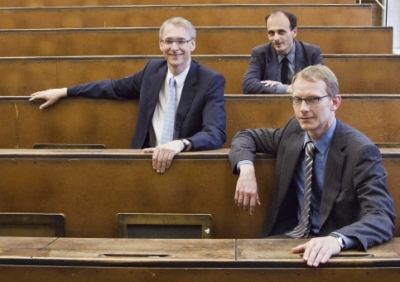Dresden-based research team has been chosen as the finalists for the 2011 Deutscher Zukunftspreis, the German Federal President’s Award for Technology and Innovation, for the creation of an innovative technology that realizes the production of energy and light utilizing wafer-thin layers of molecules and its novel work on organic semiconductors.
 Professor Karl Leo, Dr. Martin Pfeiffer, Dr. Jan Blochwitz-Nimoth (From left to right)
Professor Karl Leo, Dr. Martin Pfeiffer, Dr. Jan Blochwitz-Nimoth (From left to right)
Dr. Martin Pfeiffer, Dr. Jan Blochwitz-Nimoth and Professor Karl Leo are the researchers nominated for the award by the Deutsche Forschungsgemeinschaft (DFG), a German research foundation that provided the financial support for the researchers, and the German National Academy of Sciences Leopoldina. This team is one of the three research teams selected for the prestigious award. The winners will receive the award along with the prize money worth €250,000 at the official awards ceremony to be conducted on December 14 2011.
The researchers have studied the novel prospects of organic semiconductors. They have successfully produced customized synthetic materials with unique properties that find use in numerous applications in the form of transparent, flexible and thin films. These novel materials can be used in products such as solar cells, light-emitting diodes (LEDs) and transistors and open the door for unique photovoltaic and lighting applications.
The research team has also developed a novel technology for the quick production of organic light-emitting diodes (OLEDs) at a lower cost. The team’s major breakthrough is its better knowledge about the ageing process of the material. The teams efforts will improve the operating life and efficiency of future light collectors and organic diodes. The researchers hope to design large-scale OLEDs for applications in furniture, ceilings and walls. Their light collectors assure to offer a highly efficient process of energy production.